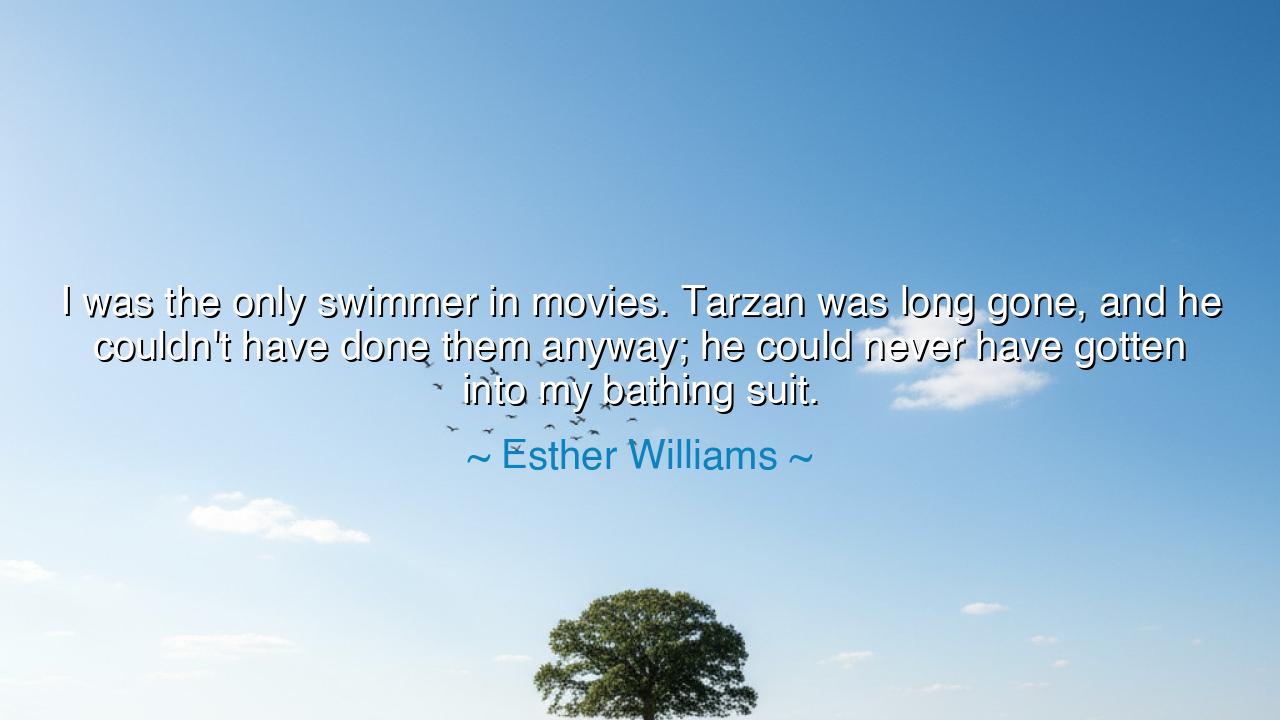
I was the only swimmer in movies. Tarzan was long gone, and he
I was the only swimmer in movies. Tarzan was long gone, and he couldn't have done them anyway; he could never have gotten into my bathing suit.






Hear, O children of remembrance, the voice of Esther Williams, who once reigned as the queen of water and cinema. She proclaimed: “I was the only swimmer in movies. Tarzan was long gone, and he couldn't have done them anyway; he could never have gotten into my bathing suit.” At first, her words shine with humor, a jest cast lightly upon the waves. Yet beneath the laughter lies the deep current of truth: that she, a woman in an age of rigid boundaries, carved her own realm, unique and unchallenged. Her declaration is a celebration of identity, of standing singular in the vast expanse of the world, and of embracing one’s gifts without apology.
For the ancients knew that greatness is not always found in imitating the heroes of the past, but in finding a path no one has yet dared tread. Tarzan, that symbol of wild masculinity, may have conquered jungles and dazzled audiences, yet he could not enter the world that Esther built. In her shimmering aquatic ballets, she was unmatched, for she did not borrow another’s crown—she forged her own. Her words remind us that each soul bears a domain uniquely theirs, where no rival may tread, because destiny has clothed them in garments that fit none but themselves.
Think of the great Queen Hatshepsut of Egypt, who, when denied the legitimacy of kingship, proclaimed herself Pharaoh. She wore the false beard of tradition, yet ruled with a wisdom and vision uniquely her own. Like Esther, she did not seek to compete with the kings of old on their terms, but reshaped the throne to fit her presence. The temples she raised still stand as proof that when one claims their unique space with confidence, even centuries cannot erase their name. So too did Esther Williams rule the silver screen, her bathing suit becoming as symbolic as any crown or scepter.
Her jesting remark also speaks to the courage of women who step into arenas dominated by men. The figure of Tarzan represented the archetype of physical prowess, yet Esther suggests with sly wit that such power cannot eclipse or replace the artistry she embodied. In her films, she transformed the pool into a temple of grace, athleticism, and beauty. It was not brute strength but elegance, discipline, and imagination that set her apart. Thus, her quote tells us: your strength need not resemble another’s; it is enough that it is yours, unique and radiant.
The lesson is clear: embrace your uniqueness with pride. Do not measure yourself by another’s garments, nor attempt to wear what was never meant for you. The world may try to compare you to Tarzans long gone, or to queens and kings who came before, but your calling is singular. What you can do, no one else can do in the same way, for destiny has crafted you with precision, like a key for a lock only you may open.
In your own life, O listener, find your “bathing suit”—the symbol of your individuality, the gift that fits you and none other. Do not shrink from it, nor dismiss it as too strange or too small. Nurture it, celebrate it, let it shine. For when you wear it with confidence, the world will see not the shadow of another, but the light of your true self.
And so, let Esther’s laughter echo as wisdom: no one else can wear what was made for you. Your art, your path, your voice, your calling—all are garments tailored to your soul. Walk in them with pride, swim in them with grace, and never let the world convince you that greatness must look like another’s. For the mightiest legacy is not to follow in another’s wake, but to leave waves of your own, as Esther did, shimmering in the waters of time.
Take this flame, then, and carry it: in a world that will try to fit you into borrowed suits, dare instead to say—this is mine, and none but I can wear it.






AAdministratorAdministrator
Welcome, honored guests. Please leave a comment, we will respond soon